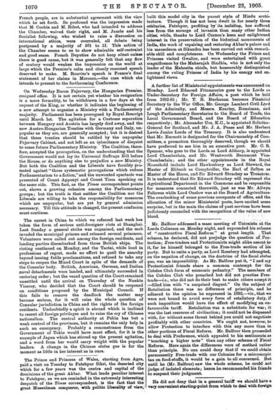The unrest in China to which we referred last week
has taken the form of serious anti-foreigner riots at Shanghai. Last Sunday a general strike was organised, and the mob invaded the municipal prisons and released several prisoners. Volunteers were called out among the foreign residents, and landing parties disembarked from three British ships. The rioting continued on Monday, and the Taotai, while loud in professions of regret, made no effort to quell the anarchy beyond issuing futile proclamations, and refused to take any steps to reopen the Mixed Court in spite of the demands of the Consular body. British, American, German, and Italian naval detachments were landed, and ultimately succeeded in restoring order ; but the vexed question of the Court remained unsettled until the arrival on Thursday of the Nankin Viceroy, who decided that the Court should be reopened on conditions proposed by the Municipal Council. If this fails to remove the deadlock the matter may become serious, for it will raise the whole question of Consular jurisdiction in China and the rights of the foreign residents. Undoubtedly a spirit is abroad which is inclined to resent all foreign privileges and to raise the cry of Chinese nationalism. The central authority at Pekin has but a weak control of the provinces, but it remains the only help in such an emergency. Probably a remonstrance from the Government of Tokio would have most effect, for it is the example of Japan which has stirred up the present agitation, and a word from her would carry weight with the popular leaders. A change in the Chinese status quo is for the moment as little in her interest as in ours.






































 Previous page
Previous page